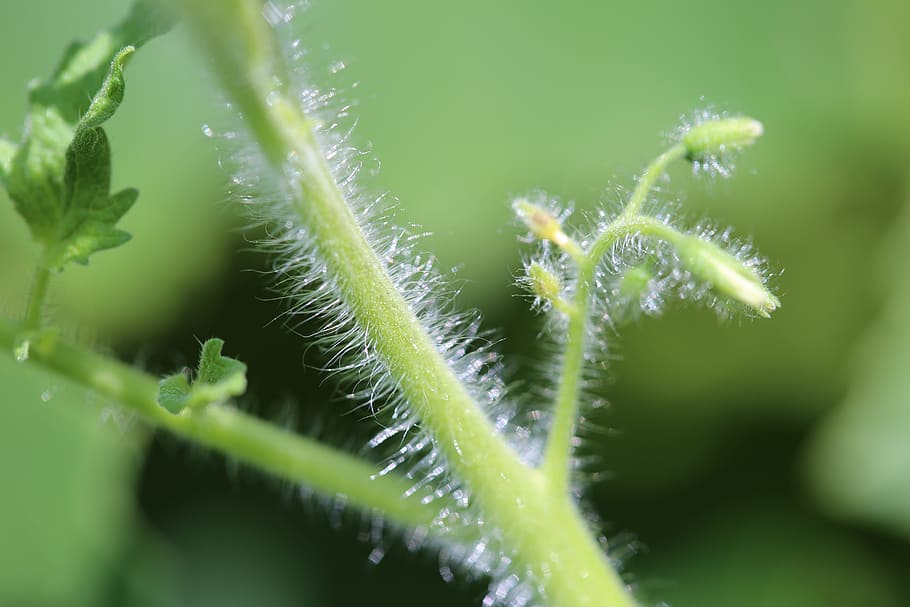UG researcher develops eco-friendly pesticide based on tomato plant

Using the tomato plant as inspiration to make natural pesticides: PhD student Abinaya Arunachalam is working on it by looking into the sticky adhesive that tomato plants make to trap pests. Her goal? Producing a non-toxic, eco-friendly pesticide, ready to spray on plants.
With more than 50% of the country’s area under farming, the Netherlands is a proud giant in the agricultural world as per the 2020 development indicators by World Bank. Hence, it is important for the country to set a right example and lead the world on the agricultural front.
Toxic pesticides
An inevitable consequence of modern day agriculture all over the world is the alarming rise of toxic chemical pesticides despite their undesired consequences, such as human sickness, increased pesticide resistance, and harm to non-target organisms. This is a direct outcome of the unavailability of non-toxic alternatives that are not only effective, but also convenient for commercial use. Scientists across the globe continually strive to find eco-friendly alternatives for many years.
Sticky glue
One such research team under Marleen Kamperman, Professor of Polymer Science at the University of Groningen, is also actively pursuing this research, but with a different approach by taking inspiration from the expert itself - nature. Abinaya Arunachalam, PhD student in this team, studies the defense mechanism of wild tomatoes for this purpose. This plant has tiny hairs on its stem called trichomes that produce a sticky glue to act as a trap for attacking pests which is a type of natural pesticide. The objective of Arunachalam’s research is to mimic these sticky trichomes to develop a non-toxic and eco-friendly alternative, that can be sprayed on all plants to impart plant defense.
Targeted pest control
Current research involves Western flower thrips as target pests on chrysanthemums as host plants since growers are also finding difficulty to control them with chemical pesticides due to increasing pesticide resistance over the years. The developed alternative must be able to trap these tiny pests and should also be easy to rinse off the plants so that it is safe to use on food crops. The added advantage of this technique is that the sprayed droplet size and stickiness can be made specific to target the undesirable pest alone and not trap the beneficial organisms; meaning smaller drops can be made for smaller pests and larger drops for larger pests. The initial application is focused for floriculture use, but there are plans to eventually expand it to agricultural crops. Kamperman and Arunachalam strongly believe that eventually the product will reach commercial viability although it might take some time. “The company that we work for is already quite enthusiastic and is even conducting field tests.” adds Arunachalam reflecting the optimism of ongoing research. In the meantime, natural enemies like predatory mites are currently being employed in greenhouses until more efficient ways are found to curb the spread of the malicious thrips.
More information
The Natural Plant Defense consortium is an NWA funded collaboration between University of Groningen, Leiden University, Aeres Hogeschool Almere, Wageningen University & Research and the industrial partners, Van Iperen, Holland Biodiversity, and Holland Green Machine. The interdisciplinary consortium works at the interface of chemistry and biology bringing together members of different expertise in the fields of plant sciences, entomology and material sciences.
Abinaya is quite enthusiastic of the ongoing research and adds that the results achieved so far are encouraging. To learn more about the research, read Tomato plants as the source of inspiration from ScienceLinx.
| Last modified: | 22 August 2023 12.23 p.m. |
More news
-
24 March 2025
UG 28th in World's Most International Universities 2025 rankings
The University of Groningen has been ranked 28th in the World's Most International Universities 2025 by Times Higher Education. With this, the UG leaves behind institutions such as MIT and Harvard. The 28th place marks an increase of five places: in...
-
05 March 2025
Women in Science
The UG celebrates International Women’s Day with a special photo series: Women in Science.
-
16 December 2024
Jouke de Vries: ‘The University will have to be flexible’
2024 was a festive year for the University of Groningen. In this podcast, Jouke de Vries, the chair of the Executive Board, looks back.
